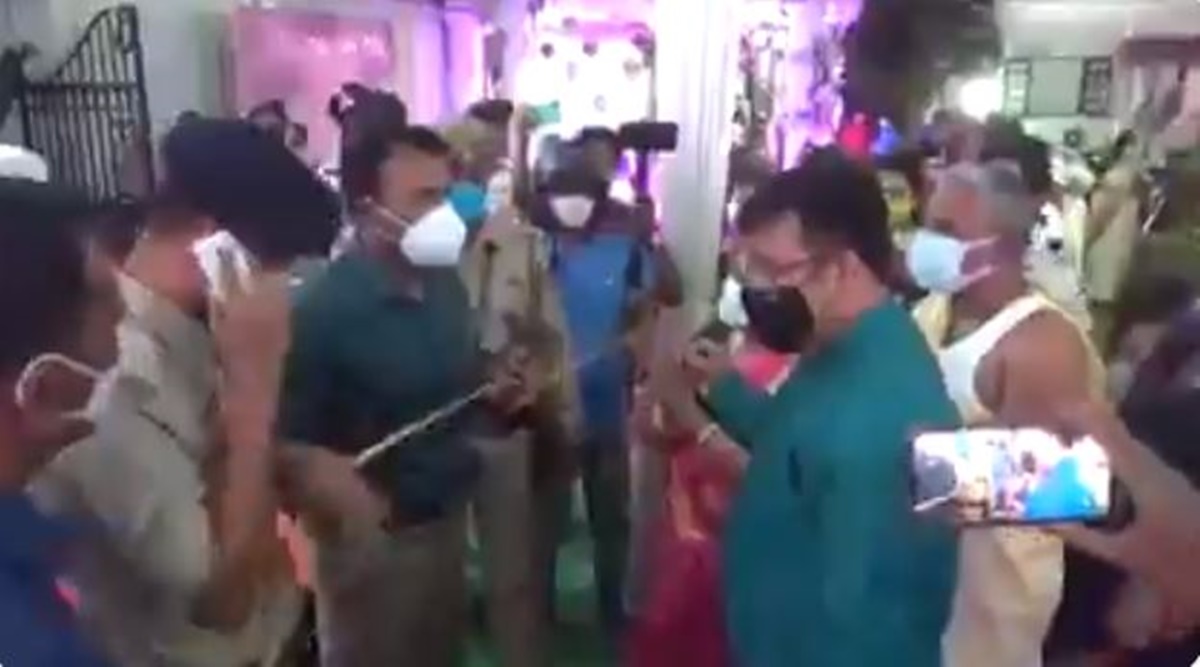In a video that went viral on social media, the District Magistrate was seen stopping a wedding ceremony at Manikya Court, a marriage hall at North Gate of the Palace Compound, supposedly after the 10 pm cutoff time for Covid-19 night curfew to come into force in the Agartala Municipal Council (AMC) areas.
By Debraj Deb Tripura
West District Magistrate (DM) Dr Shailesh Kumar Yadav orders closure of
two marriage halls for violating night curfew order in Agartala.
(Photo: Twitter/@Pronamotweets)
Tripura
West District Magistrate (DM) Dr Shailesh Kumar Yadav orders closure of
two marriage halls for violating night curfew order in Agartala.
(Photo: Twitter/@Pronamotweets)
Agartala: West Tripura District Magistrate Sailesh Kumar Yadav Tuesday apologised for disrupting a marriage at Manikya Court in Tripura, saying he didn’t intend to “hurt anyone’s sentiments”. Chief Minister Biplab Kumar Deb has asked Chief Secretary Manoj Kumar to submit a report on the events that transpired.
In a video that went viral on social media, the District Magistrate was seen stopping a wedding ceremony at Manikya Court, a marriage hall at North Gate of the Palace Compound, supposedly after the 10 pm cutoff time for Covid-19 night curfew to come into force in the Agartala Municipal Council (AMC) areas. The video showed him shoving out the bridegroom, arresting everyone present including the bride and groom’s family and tearing up a written permission for the wedding signed by himself.
Tripura West District Magistrate (DM) Dr Shailesh Kumar Yadav ordered closure of 2marriage halls for violating night curfew order in Agartala.
Tough times calls for tough measures..wish to see the same kind of action on other religious gatherings also.#COVID19India pic.twitter.com/wm6TCkJQdO
— ProNaMo (@Pronamotweets) April 27, 2021
Yadav said everyone who gathered at the site were in direct violation of prohibitory orders under Section 144 of thr CrPC and would be prosecuted. Over 30 people were arrested and released later.
Opposition leader Manik Sarkar and the CPIM termed the incident as ‘undesired’ and unbecoming of the District Magistrate. It sought proper action against the DM for his behavior.
West Tripura MP and BJP leader Pratima Bhowmik said she would visit the bride’s relatives and speak to them over the incident. “The administration is doing what’s needed to break the chain of transmission of coronavirus. But what happened last night is most undesired. It should not have happened,” the MP said.
@sanjayswadesh @BjpBiplab @nitideb @IASassociation @Tripura_Police
Great work by DM West Tripura. pic.twitter.com/CKxwtQli2i— Paul Kalai (@paul_kalai) April 26, 2021
Tripura royal scion Pradyot Kishore Manikya Debbarma and chief of TIPRA Motha, which recently won the tribal council elections here, is also the owner of Manikya Court, where the incident happened. In a Facebook post, he called for a complete investigation of the incident and said he will close down the marriage hall “as per the VERBAL direction of Honourable DM Sahib”.
Ruling BJP MLAs including Sudip Roy Barman, Ashish Kumar Saha and Sushanta Choudhury have written to Chief Secretary Manoj Kumar seeking removal of the DM.
After a day of severe criticism on social media, the DM apologised for what happened on Monday night. “All I did was done during the night curfew period last night and was for the benefit and wellbeing of the people. My intention was not to hurt or humiliate the sentiments of anyone,” Yadav told reporters.
Tripura imposed night curfew in Agartala municipal areas on April 22 with a new surge in Covid-19 cases. The state now has 793 active coronavirus patients and two deaths in the last 24 hours.












 Agartala, Aug 7 :
The first consignment of food grains for landlocked northeast India’s Tripura state has reached the Ashuganj river port, a minister here said.
Agartala, Aug 7 :
The first consignment of food grains for landlocked northeast India’s Tripura state has reached the Ashuganj river port, a minister here said.









